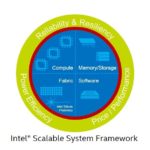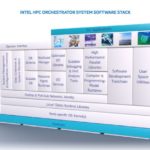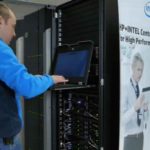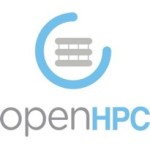With Intel Scalable System Framework Architecture Specification and Reference Designs, the company is making it easier to accelerate the time to discovery through high-performance computing. The Reference Architectures (RAs) and Reference Designs take Intel Scalable System Framework to the next step—deploying it in ways that will allow users to confidently run their workloads and allow system builders to innovate and differentiate designs
Facilitate HPC Deployments with Reference Designs for Intel Scalable System Framework
OpenHPC – Community Building Blocks for HPC Systems
Karl Schulz from Intel presented this talk at the 4th Annual MVAPICH User Group meeting. “Today, many supercomputing sites spend considerable effort aggregating a large suite of open-source projects on top of their chosen base Linux distribution in order to provide a capable HPC environment for their users. This presentation will introduce a new, open-source HPC community (OpenHPC) that is focused on providing HPC-centric package builds for a variety of common building-blocks in an effort to minimize duplication, implement integration testing to gain validation confidence, incorporate ongoing novel R&D efforts, and provide a platform to share configuration recipes from a variety of sites.”
Nor-Tech to Offer Clusters with Intel HPC Orchestrator
Today Nor-Tech announced the imminent rollout of clusters integrated with the Intel HPC Orchestrator. HPC Orchestrator is a licensed, value-add version of OpenHPC that will be supported by Intel and Nor-Tech.
Hewlett Packard Enterprise and Intel Alliance Delivers New Centers of Excellence for HPC
Intel and Hewlett Packard Enterprise (HPE) have recently created two new Centers of Excellence (CoE) to help customers gain hands-on experience with High Performance Computing (HPC). This plus collaboration with customers on implementing the latest technology solutions are highlights being celebrated by the two companies on the one-year anniversary of their alliance.
Raj Hazra Presents: Driving to Exascale
Raj Hazra presented this talk at ISC 2016. “As part of the company’s launch of the Intel Xeon Phi processor, Hazra describes how how cognitive computing and HPC are going to work together. “Intel will introduce and showcase a range of new technologies helping to fuel the path to deeper insight and HPC’s next frontier. Among this year’s new products is the Intel Xeon Phi processor. Intel’s first bootable host processor is specifically designed for highly parallel workloads. It is also the first to integrate both memory and fabric technologies. A bootable x86 CPU, the Intel Xeon Phi processor offers greater scalability and is capable of handling a wider variety of workloads and configurations than accelerator products.”
Podcast: Intel Scalable System Framework Moves HPC Forward at the System Level
In this Intel Chip Chat podcast, Alyson Klein and Charlie Wuischpard describe Intel’s investment to break down walls to HPC adoption and move innovation forward by thinking at a system level. “Charlie discusses the announcement of the Intel Xeon Phi processor, which is a foundational element of Intel Scalable System Framework (Intel SSF), as well as Intel Omni-Path Fabric. Charlie also explains that these enhancements will make supercomputing faster, more reliable, and increase efficient power consumption; Intel has achieved this by combining the capabilities of various technologies and optimizing ways for them to work together.”
Dell & OpenHPC at ISC 2016
In this video from ISC 2016, Onur Celebioglu from Dell describes how the company is working with the OpenHPC Community to ease the deployment of high performance computing solutions. “Community investment in open source frameworks and open standards is the right way to ensure the right capabilities are available to a growing HPC community. The new OpenHPC effort will greatly accelerate HPC adoption, productive usage and innovation. As a long-time leader in democratizing HPC, Dell is proud to be a founding member of this effort.”
SUSE Powers OpenHPC at ISC 2016
With the OpenHPC stack, you can leap forward with a validated, tested and secure infrastructure software stack and get to product in a fraction of the time. This new approach will drive rapid advances in the state of the art and accelerate our progress towards true exascale computing. “SUSE, as a founder and board member of OpenHPC, contributes not just to the Linux OS elements of the project but also to the underlying HPC system building componentry and system tools that can bridge today’s infrastructure development gaps and help move vendors and researchers rapidly towards powerful HPC solution stacks.”
Video: Bob Wisniewski on OpenHPC at ISC 2016
In this video from ISC 2016, Bob Wisniewski from Intel provides an update on OpenHPC community activities. “OpenHPC is a collaborative, community effort that initiated from a desire to aggregate a number of common ingredients required to deploy and manage High Performance Computing (HPC) Linux clusters including provisioning tools, resource management, I/O clients, development tools, and a variety of scientific libraries. Packages provided by OpenHPC have been pre-built with HPC integration in mind with a goal to provide re-usable building blocks for the HPC community. Over time, the community also plans to identify and develop abstraction interfaces between key components to further enhance modularity and interchangeability.”
Intel to Distribute SUSE High Performance Computing Stack
“The SUSE and Intel collaboration on Intel HPC Orchestrator and OpenHPC puts this power within reach of a whole new range of industries and enterprises that need data-driven insights to compete and advance. This is an industry-changing approach that will rapidly accelerate HPC innovation and advance the state of the art in a way that creates real-world benefits for our customers and partners.”













